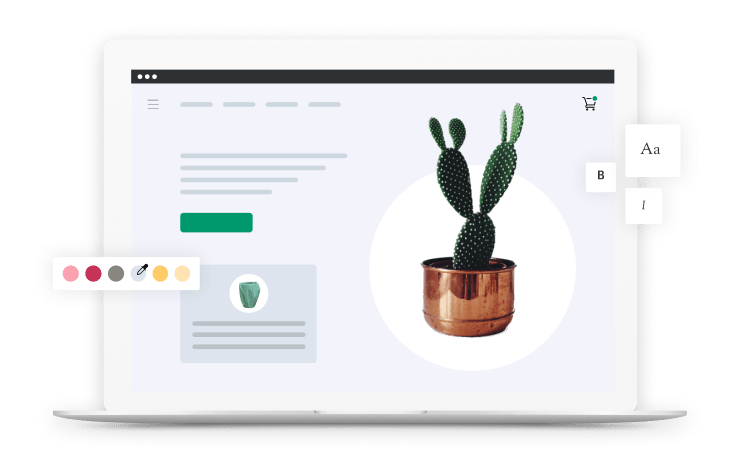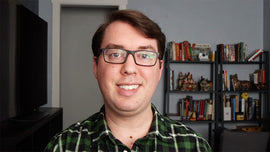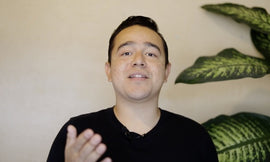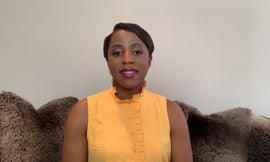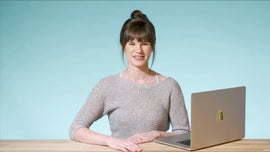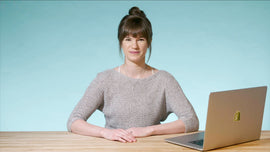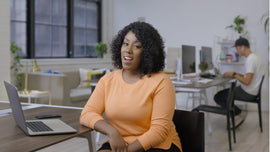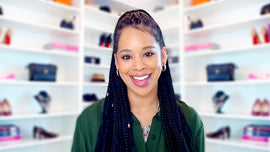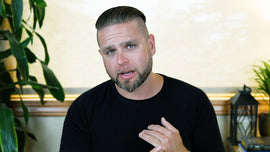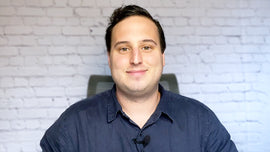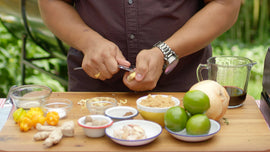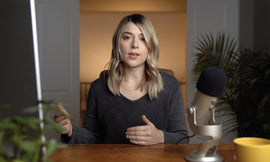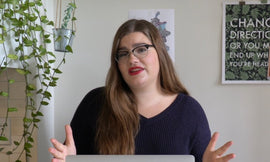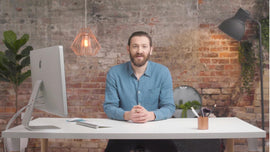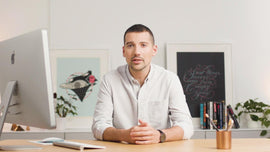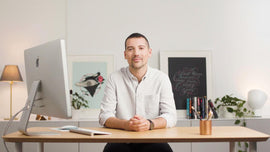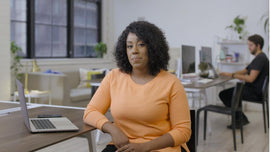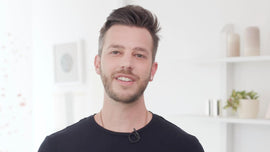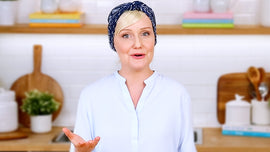0:03
Thanks for joining me, folks. I'm really hoping that you can get excited about understanding partnerships that can enrich the community. And just looking at new ways of how you can improve connections, network, make a bigger impact in your community and apply this to any cause that you really stand behind.
0:22
Hospitality has been my whole life. I've worked in the restaurants since I was legally old enough to work. I've traveled the world and worked with some pretty amazing people and some pretty unique situations. And the thing I love about the hospitality industry is it is just so receptive to everyone, and it is so inviting.
0:39
It's a group that has always been strong with their community and has been a pillar of the community for trying to make efforts and show that real change is possible. I've seen the impact that COVID-19 and this whole pandemic has had on our industry. Right now, more than ever, it's really important that we support each other, that we support the community.
0:58
People are both having trouble navigating through it, but also creating a lot of really innovative solutions, creating a lot of really innovative connections and they're really pivoting their business model and what that looks like. And that to me, it's just been profound to see. People who can pivot and be responsive and reflexive and are able to change what they're doing and continue to build empowering partnerships that only benefit themselves in the restaurant, but benefit the community, sends a real powerful message to people.
1:26
Let's sink your teeth into this a little bit, let's start pulling apart. What exactly are partnerships? What kind of partnerships exist that allow you to enrich the community? And what they also mean to you? Because I think that's a really important part as well.
1:42
So before you can really start signing off and getting behind a certain partnership, I do think there's a few steps that people really need to cover. I think the first step is being really receptive to every cause. There are infinite causes that people want to support and stand behind. And that person coming up to you putting themselves out there, it's putting ourselves in a vulnerable position to showcase that they believe in something, and just like you believe in something, they want to make a difference in the world.
2:09
听到这个消息的人是很重要的。和being aware that saying “no” is OK. You can say no to a cause, you can say no to donating your time, if you know that you can't contribute all of your effort to this, and all of your vision to this. I don't think it's a partnership that you should really get involved with.
2:28
What you really want to do is define this relationship, this partnership, is going to become. Is it a partnership where you're going to be compensated for your efforts? Is it a partnership where you're able to use your own audience as a platform? Or is it something that is totally altruistic in the sense that all you're doing is working to improve the well-being of the community?
2:49
I think the last part is doing your research. Every partnership that you align with, what you're saying is that you stand behind their practices, their core belief system, their ideology and you're publicly putting that affirmation outwards.
3:06
So it's really important to do your research and understand what are these people involved with? What are they doing? How has the community responded to them? You need to be protective of your public image, so that you can take on new initiatives, and you can take on new causes, and new things you get behind. Doing your research allows you to be in control and to avoid any surprises basically.
3:28
So I think the most common type of partnership is also the one that people feel the most conflicted about. And that's a transactional partnership, or giving you financial compensation for content, for recipes, for cooking demos. These companies want to provide you with the opportunity to work with them, but also to continue to make a living wage that you can go forward with. The importance of being financially compensated is that it's going to allow you to take on opportunities that maybe don't provide financial compensation in the future, to create a sort of equilibrium.
3:55
And that's really important. I think the most basic kind of partnership that is transactional would be an ambassador role. Somebody wants to give you a product that you can showcase and as a result, they can reach a new audience and reach a new level of engagement. I worked with a company called Kotn.
4:12
Kotn is a clothing company that's located in Toronto primarily. What they do is they provide Egyptian cotton basic wear; shirts, pants, sweaters, hoodies, that sort of thing. They come into a community in Egypt and they focus on fair pay.
4:28
They focus on creating job opportunities in that area. And the thing that makes them really unique is they focus on building a school within that community. So when we're talking about is this a good partnership to get into? This is a check for me. I think that this is something that I really line up for socially and I really love being able to support.
4:48
I think the reason that people feel a lot of conflict in this sort of partnership is that there's a lot of difficulty in seeing that your contribution can have value both in the community, and for yourself. It's really important to acknowledge your effort and acknowledge your time. While not every opportunity is going to present itself as financial compensation, I don't think you necessarily need to be afraid to ask that initially.
5:14
And again, we're returning back to defining that relationship. What kind of ask, is this person presenting you with, this partner presenting you with? And that's going to kind of tailor your response and a result. Second kind of partnership may or may not provide compensation but still has a lot of value.
5:30
I like to call this one showcasing, because what it's really about is using your own audience. And it's bringing a certain cause. Maybe it's a certain farm or a smaller company and you're bringing them forward and you're connecting with your audience and saying “these are people that I really admire.
5:46
These are people that we really rely on. This is a group of people that we need.” A restaurant like Montgomery's, they've done a really great job of building a small market box to promote smaller farms. You might find different vegetables, you might find a little bit of cheese, maybe some great eggs, and then you can have add-ons.
6:03
Maybe it's this farm's duck that's supposed to be really amazing. Maybe it's this farm's cheese that they make that's exceptional. It's putting that trust and it's kind of building that system where a restaurant is saying “I know these people. I know how hard they work. I want to advocate for them. So we can push them forward.” I think during crises like these, we often forget the people who are behind the scenes, we forget the people in the supply chain who bring it into the restaurants.
6:27
But a lot of times that's what puts them the most at risk. The next time when we do get to go to restaurants you see it. You can recognize that farm. I remember I had a great seller act from them. I'm going to order that dish. I mean you're almost putting a name and a face onto who actually grows your food, which is really a very human connection. Last kind of partnership I'm going to talk about as an altruistic partnership.
6:50
This is one where you're contributing your time, funds, ideas, content, social media platform, whatever, with no expectation of compensation financially. You're providing a social return. You're improving someone's life. You're extending hospitality to community level and you want to show that this is a cause you can get behind.
7:08
It's a pure donation of your efforts, which can make it very challenging, but the impact that you're having can make it also very rewarding. I've done events with local food bank called The Stop. And they really focus on taking the stigma out of food insecurity and working to show that it's a human right that everyone is entitled to food and they do a night market. The night market everyone gets a little ticket, your ticket, you can go to each restaurant that you love, filled with great chefs, food, great cocktails, all this, this whole thing.
7:37
It's an actually beautiful experience if you've never been and all that fundraising goes towards food services. To know that you're able and have a skill set that allows you to make an impact like this and be able to contribute in any way possible. I'm always taken aback by it.
7:55
And I'm always very proud of it. And these altruistic partnerships are one that I personally feel like I emotionally thrive in, because I just feel so empowered and enabled to put myself forward and to be able to benefit the community.
8:13
So those are the three kinds of partnerships, the baseline and common thread that ties all of this is that you're enriching the community, that you're improving someone's life, that you care enough that you want to contribute your time, as best you can to make as big an impact as you can in the world. That's sort of the lasting thing that you leave behind and your legacy and your professional career.
8:32
COVID-19 has really showed us that we can do it. It really showed us that we can make a huge impact on people and that we can improve people's lives even if it's a small change, all these small changes eventually add up. As hard as it can be to be inside, as hard as it can be to look at things transpiring outside, we also can't forget the narrative that people are working to make a difference and people are pivoting their business models to make a difference.
8:58
I feel so thankful to be in an industry where I'm able to contribute my efforts and my knowledge, and my creativity and my skills so that I can make a difference in someone's life. I really implore you to, you know, get involved, get creative, put yourself out there and kind of see what you can muster up.
9:15
I think there's a lot of possibility in it. And we're going to see some pretty amazing initiatives evolve as a result of all of this. So thanks so much for joining me. I really hope I've answered a lot of questions here. And I look forward to seeing everyone out in the world when we can go out.
